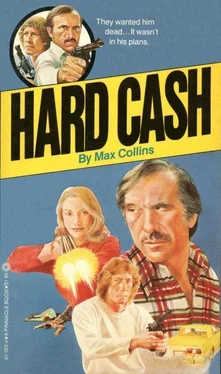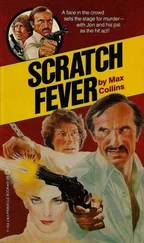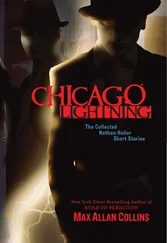Max Collins - Hard Cash
Здесь есть возможность читать онлайн «Max Collins - Hard Cash» весь текст электронной книги совершенно бесплатно (целиком полную версию без сокращений). В некоторых случаях можно слушать аудио, скачать через торрент в формате fb2 и присутствует краткое содержание. Город: New York, Год выпуска: 1982, ISBN: 1982, Издательство: Pinnacle Books, Жанр: Криминальный детектив, на английском языке. Описание произведения, (предисловие) а так же отзывы посетителей доступны на портале библиотеки ЛибКат.
- Название:Hard Cash
- Автор:
- Издательство:Pinnacle Books
- Жанр:
- Год:1982
- Город:New York
- ISBN:9780523411637
- Рейтинг книги:3 / 5. Голосов: 1
-
Избранное:Добавить в избранное
- Отзывы:
-
Ваша оценка:
- 60
- 1
- 2
- 3
- 4
- 5
Hard Cash: краткое содержание, описание и аннотация
Предлагаем к чтению аннотацию, описание, краткое содержание или предисловие (зависит от того, что написал сам автор книги «Hard Cash»). Если вы не нашли необходимую информацию о книге — напишите в комментариях, мы постараемся отыскать её.
Hard Cash — читать онлайн бесплатно полную книгу (весь текст) целиком
Ниже представлен текст книги, разбитый по страницам. Система сохранения места последней прочитанной страницы, позволяет с удобством читать онлайн бесплатно книгу «Hard Cash», без необходимости каждый раз заново искать на чём Вы остановились. Поставьте закладку, и сможете в любой момент перейти на страницу, на которой закончили чтение.
Интервал:
Закладка:
The idea of killing did. Jon valued human life. He had respect for it, did not believe in hurting people. He did not enjoy seeing people suffer, could hardly bear to see someone suffer.
On the heist in Detroit, two months ago, he had killed a man.
A crazy old man named Sam Comfort, who was pointing a shotgun at Nolan, getting ready to let loose that shotgun straight into Nolan’s guts.
And Jon had shot Sam Comfort.
A man who was a double-crossing, probably psychopathic and wholly corrupt thief, in the worst sense of that word, who had betrayed his compatriots time and time again. Killed time and again. A man who, in the opinion of many, deserved to die anyway.
In this case, however, Jon couldn’t make the rationalizations work for him. He hadn’t had a decent night’s sleep since Detroit.
And Detroit wasn’t all He would lie awake and think back to the earlier heist the very first one, the Port City bank job, and realize that that time the same thing could have happened: guns could have started going off. He and Nolan had been holding guns on innocent people at that bank, innocent people who could have gotten in the way of guns going off and been killed.
It was hard enough living with the thought of killing a Sam Comfort. But the thought of even the possibility of causing the death of an innocent person, a “civilian,” as Nolan would put it, was something Jon could not bear.
So he was glad the game was over. He would miss the positive side of it, the excitement, the heady rush brought on by the presence of danger, the satisfaction of working well under pressure, and of meeting Nolan’s high professional standards; but as for the dark side, the blood and killing and all of that, good riddance.
The cop show on the tube seemed to be ending, a shootout in progress. People were dying in that sterile, bloodless way people die on television. He got up and switched the channel and the same thing was going on, but with slightly different faces. He turned it off, got his sketch pad, and began to doodle, finally roughing out a graphic story idea he’d had in the back of his head a while. He lost himself in the drawing, and the upsetting thoughts of death and violence left him.
Around nine he heard Nolan coming up the steps.
“How come back so early?” he asked Nolan as he came in, not looking up from the sketch pad.
“Here,” Nolan said, and Jon looked up.
Nolan was tossing something at him.
“You’re maybe going to need that,” Nolan said.
Jon looked down at what he’d caught: a gun.
Nolan disappeared into the bedroom.
Jon stared at the snubnose .38 as if he couldn’t remember what it was for. In a moment Nolan was coming out of the bedroom, getting into his shoulder holster.
“I had a visitor at the Pier tonight, lad,” Nolan was saying. “George Rigley.”
“Uh, George who ?”
“Rigley.” He was loading slugs into the long-barrel .38 now. “President of the Port City bank.”
“Port City... Jesus. Did he...?”
“Recognize me? Like a long-lost identical twin brother.”
Jon didn’t say anything. He was having trouble just thinking. Talking was out of the question.
“He wants us to rob the Port City bank again,” Nolan said
Jon felt his mouth drop open, but nothing came out
“We got two choices, kid. The guy’s evidently been doing some book-juggling, and wants us to rob his bank for him so he can cover, and we can do that. That’s one choice. The other choice is obvious.”
The other choice was to kill the bank president.
“Well, Jon,” Nolan said, shoving the gun down snug in the underarm holster. “What’s your preference? Choice A or B?”
“How... how about ‘none of the above.’”
“That’d be my choice too... if it was a choice.”
“Then... then I suppose we rob his fucking bank. Christ.”
Nolan sat on the edge of the couch. Jon was sitting up now; it wasn’t the land of news you took lying down. Nolan said, “There are some things we have to do tonight. Kid? You listening?”
Jon let out the breath he’d drawn in and had been holding for forty seconds or so. “Yeah. I’m okay. Go ahead with what you were saying, Nolan. Shoot.”
4
Rigley’s cottage was little different from any of the others along the Cedar River. Like most of them, it looked more like a small house than a cottage: an unassuming white clapboard high on a bank that sloped down gently to the river.
Nolan shrugged out of his heavy leather coat as he came in, tossing it on a plaid upholstered couch. Rigley followed, got out of a gray, fur-collared coat, and hung it on the rack by the door; he hung Nolan’s there too.
This front room — which apparently took up at least half the floor space of the cottage — had a comfortable masculine look to it. The walls were paneled in pine, and big pine-shuttered windows faced the river and flanked either side of a central fireplace, a massive affair of rust-color brick with a healthy blaze going in it. The furniture was lived-in looking, and there was no overhead lighting, just a standing lamp here and there. Rigley was an outdoorsman, evidently, or anyway fancied himself one; a mounted fish hung over the fireplace, and some pictures of ducks in flight flew above the couch. And down at the far end of the room, a small but overstocked bar was watched over by one of those big, lighted-up beer signs of an animated outdoor scene — a stream running through lush green woods. A masculine-looking room, all right, but a woman lived here. Nolan could see her in the neatness of the housekeeping; the dazzling polish of the hardwood floor, which was reflecting the glow of the fireplace like a huge mirror; the floral centerpiece of an otherwise rugged-looking picnic-type table. She was here now: Nolan could feel her presence. He could smell her.
But Rigley said nothing about a woman being here, or anyone else, for that matter.
Which didn’t explain why the fire was going when they got there.
The conversation between Nolan and Rigley at the Pier had been a brief one. Rigley had wanted to continue the conversation elsewhere, out of the public eye, a sentiment Nolan couldn’t have shared more. Rigley mentioned this cottage of his as a possible meeting place and Nolan accepted, but suggested that the two of them not be seen leaving the restaurant together. So they’d agreed to meet at ten in the parking lot of the Target store on the way out of town; Nolan would then follow Rigley to the cottage on the Cedar River, between Iowa City and Port City. Which had given Nolan time to stop at the antique shop and fill Jon in.
And now here he was with Rigley, at the cottage, with someone — some woman — listening on in another room.
Rigley was behind the bar, fixing himself something. “What can I build you, Mr. Logan?”
Logan was the name Nolan was using at the Pier.
“Nothing,” Nolan said.
“Come on, now,” Rigley said, with patronizing smile and tone to match. “I see no reason why we can’t be sociable. We’re going to be working together rather closely for the next few weeks, after all.”
Nolan sighed. He plopped his ass down on the couch. The couch was close to the door. He unbuttoned his jacket and folded his arms to prevent the gun under his arm from showing. Between Rigley’s phony pleasant attitude and knowing somebody was in the next room, Nolan felt pretty uncomfortable. Rigley hadn’t turned on any lights yet, so there was just the light from the fire, which was short on illumination and long on creating a sinister, shadow- throwing atmosphere. Nolan said, “Make it a beer then.”
Rigley brought Nolan a beer, pulled a straight-back chair from somewhere, and sat facing him. Looking down at him. All he lacks , Nolan thought, is his goddamn desk .
Читать дальшеИнтервал:
Закладка:
Похожие книги на «Hard Cash»
Представляем Вашему вниманию похожие книги на «Hard Cash» списком для выбора. Мы отобрали схожую по названию и смыслу литературу в надежде предоставить читателям больше вариантов отыскать новые, интересные, ещё непрочитанные произведения.
Обсуждение, отзывы о книге «Hard Cash» и просто собственные мнения читателей. Оставьте ваши комментарии, напишите, что Вы думаете о произведении, его смысле или главных героях. Укажите что конкретно понравилось, а что нет, и почему Вы так считаете.












